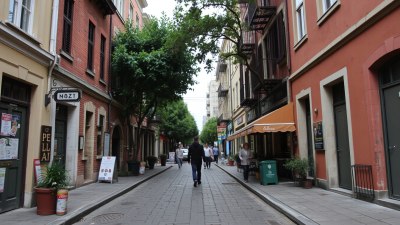Travel That Feels Like Trespassing
Explore the allure of travel that borders on the forbidden, igniting adventure and ethical dilemmas.

Image created with Flux Schnell
Traveling is often seen as a way to explore new cultures, expand horizons, and enjoy beautiful landscapes, but there is an element of thrill that comes from traveling to places that feel off-limits, creating a sense of adventure that borders on the illicit. This type of travel, which we can call ‘trespassing travel,’ appeals to those who seek something beyond the typical tourist experience. Whether it's wandering through less-traveled paths or entering abandoned buildings, these experiences are filled with excitement, but they also raise ethical questions about respect and responsibility.
When we think about travel that feels like trespassing, it often conjures images of explorers stepping into uncharted lands or urban adventurers infiltrating abandoned structures. This blend of curiosity and risk can lead travelers to seek destinations that push boundaries—both geographically and morally. This article will explore various forms of this travel, and the ethical considerations that accompany such adventures.
The Allure of the Forbidden
The desire to experience places that feel forbidden is deeply rooted in human nature. It taps into the same impulses that make us curious about what lies beyond the walls of conventions and societal norms. From abandoned amusement parks to hidden beaches, the thrill lies in discovering the unknown.
For instance, the allure of abandoned places is captivating for many. They represent a time gone by, whispering stories of the past. Adventurers often find themselves drawn to derelict sites, ranging from old factories to forgotten towns. These locations often ignite the imagination with visions of what once was, creating a powerful connection that feels almost sacred. However, these adventures can also come with risks, such as potential legal issues, safety hazards, and environmental impact.
Urban Exploration: The Modern-Day Tomb Raiders
Urban exploration, or urbex, is one of the most thrilling forms of trespassing travel. It involves exploring abandoned buildings, factories, and other infrastructure in urban settings. Urbexers often seek out sites that are not only visually stunning but also rich in history. The urban landscape becomes a playground for those looking to step outside conventional travel.
However, urban exploration raises significant ethical considerations. Many sites, though abandoned, remain privately owned, and entering without permission can result in legal consequences. Moreover, there’s a delicate balance between adventure and respect for the property and its history. It’s vital for urban explorers to challenge themselves to leave no trace and to carefully consider their impact on the community and environment.
Restricted Areas and the Quest for Adventure
Some travelers are drawn to areas that are explicitly off-limits, whether due to military restrictions, environmental protections, or safety concerns. The thrill of traveling to places that feel like they operate outside the laws can be intoxicating. However, pursuing this kind of adventure often comes at a high price, not only in terms of legality but also the potential risks to personal safety.
For example, several military bases around the world are no-go zones for civilians, yet information about these locations finds its way to the curious traveler. Stories of infiltration and stealth missions capture the imagination, and some individuals challenge themselves to break through these barriers. These quests often lead to beautiful, haunting images that tell tales of neglect and the mysterious beauty of abandonment. Yet, the consequences of being caught can often lead to significant legal ramifications, putting into question the true ‘value’ of such experiences.
Ethical Considerations in ‘Trespassing Travel’
While the thrill of ‘trespassing travel’ is undeniable, it’s crucial to consider the ethical ramifications of engaging in such activities. Some essential questions to ask include: Does this adventure respect the history and cultural significance of the location? Are your explorations infringing on someone else's rights? Will your visit contribute positively to the environment, or will it cause harm?
Being a responsible traveler doesn't mean avoiding thrilling experiences; rather, it means being mindful of the impact your adventures have on both the location and the communities involved. The spirit of adventure and appreciation for the world around us should drive us, but that enthusiasm must not overshadow respect and ethical behavior.
Finding Less-Traveled Paths
There are countless destinations worldwide that offer a sense of ‘trespassing’ without crossing ethical boundaries. These less-traveled paths often lead to stunning landscapes, rich cultures, and unforgettable encounters with locals. By veering off the typical tourist path, travelers can find spaces that feel exclusive and hidden—without the legal or moral dilemmas associated with true trespassing.
Consider places like hidden waterfalls in the jungles of South America or tucked-away villages in Eastern Europe that promise authentic experiences. Embracing these lesser-known spots can provide a genuine understanding of a place and its people, making for rich memories that contribute both to personal growth and community sustainability.
Adventure with Purpose
When engaging in travel that feels like trespassing, it's important to juxtapose excitement with intention. Adventures can become more meaningful when they serve a purpose beyond personal thrill-seeking. Consider volunteering opportunities in remote communities or participating in conservation efforts in ecologically sensitive areas. These experiences allow travelers to engage deeply with locations and communities, creating impactful exchanges.
Travel that includes an element of purpose not only enriches the journey but also provides a sense of accountability. By contributing positively to the places you visit, you help preserve the cultural and environmental integrity of these spaces, ensuring that they remain available for future explorers.
The Digital Age and Adventure Sharing
Today, technology plays a crucial role in shaping how individuals view and pursue ‘trespassing travel.’ Platforms such as social media and travel blogs have given rise to a new generation of adventurers who share their experiences online. This trend of sharing also extends to documenting uncharted territories, hidden gems, and urban explorations.
As travelers share their experiences, it sparks the curiosity of others. However, this sharing can lead to overcrowding in areas that once felt intimate. Popularity can turn ‘secret’ spots into tourist hubs, drowning the original charm in the tide of visitors. Therefore, ethical travel practices and personal responsibility become even more important in an age where information spreads rapidly.
Developing a Personal Code of Conduct
The inherent thrill of travel that feels like trespassing should be approached with a set of personal guidelines. By establishing a personal code of conduct, travelers can navigate their adventures in a way that prioritizes respect, safety, and legality. Some key components to consider include:
- Research before visiting any site or location, understanding its history and significance.
- Seek permission wherever possible, especially for urban explorations.
- Leave no trace and ensure any tracks you leave won’t harm the environment.
- Engage positively with local communities, respecting their customs and boundaries.
- Consider the broader implications of your travel choices and strive to leave places better than you found them.
Travel enriches our lives, broadening our views and connecting us with diverse experiences. When undertaken with respect and responsibility, even those adventures that feel like trespassing can contribute to personal growth and encourage a deeper appreciation of the world around us. Embracing the thrill while maintaining ethical consciousness allows for a fulfilling journey that enhances both the traveler and the sites they explore.
Balancing Thrill and Responsibility
Traveling in ways that feel like trespassing can offer unparalleled excitement and adventure. However, with this thrill comes great responsibility. It’s imperative that as we venture to discover new places, we remain aware of our impact on those locations, honoring their history, significance, and community. The most enriching experiences can often be found by blending curiosity with respect and ethical awareness, ensuring that our thirst for adventure doesn’t come at the expense of the very things we wish to explore.
Through mindful exploration, we cultivate a deeper understanding of the landscapes and cultures that pique our curiosity while helping to preserve their beauty for future generations. In essence, the best kind of travel journey is not a conquest but a connection.











